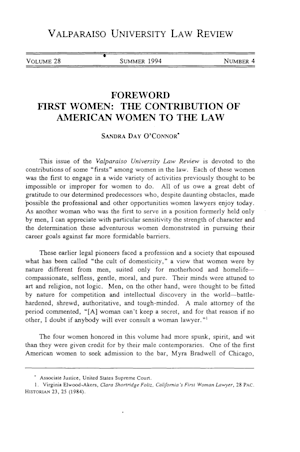By Justice Sandra Day O'Connor
Foreword: First Women: The Contribution of American Women to the Law
June 1993

DISCLAIMER: This text has been transcribed automatically and may contain substantial inaccuracies due to the limitations of automatic transcription technology. This transcript is intended only to make the content of this document more easily discoverable and searchable. If you would like to quote the exact text of this document in any piece of work or research, please view the original using the link above and gather your quote directly from the source. The Sandra Day O'Connor Institute does not warrant, represent, or guarantee in any way that the text below is accurate.
Article Text
(Excerpt, Automatically generated)
FOREWORD
FIRST WOMEN: THE CONTRIBUTION OF AMERICAN WOMEN TO THE LAW
SANDRA DAY O'CONNOR*
This issue of the Valparaiso University Law Review is devoted to the contributions of some "firsts" among women in the law. Each of these women was the first to engage in a wide variety of activities previously thought to be impossible or improper for women to do. All of us owe a great debt of gratitude to our determined predecessors who, despite daunting obstacles, made possible the professional and other opportunities women lawyers enjoy today. As another woman who was the first to serve in a position formerly held only by men, I can appreciate with particular sensitivity the strength of character and the determination these adventurous women demonstrated in pursuing their career goals against far more formidable barriers.
These earlier legal pioneers faced a profession and a society that espoused what has been called "the cult of domesticity," a view that women were by nature different from men, suited only for motherhood and homelife- compassionate, selfless, gentle, moral, and pure. Their minds were attuned to art and religion, not logic. Men, on the other hand, were thought to be fitted by nature for competition and intellectual discovery in the world-battle hardened, shrewd, authoritative, and tough-minded. A male attorney of the period commented, " [A] woman can't keep a secret, and for that reason if no other, I doubt if anybody will ever consult a woman lawyer."1
The four women
